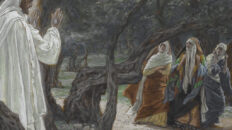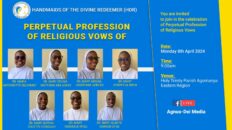THEME: RECEIVING THE WORD OF GOD
READINGS: Isaiah 55:10-11/ Romans 8:18-23/ Matthew 13:1-23
15th Sunday in Ordinary Time
Thus says the Lord: “For as the rain and the snow come down from heaven,
and do not return there until they have watered the earth,
making it bring forth and sprout …
so shall my word be …
it shall not return to me empty,
but it shall accomplish that which I purpose” (Isa. 55:10-11).
That is, God’s word achieves what He intends it to accomplish; it is efficacious. For instance, when God wanted to create the universe, His word brought it into existence, without fail. For example, when He said, “Let there be light”, light came into existence, without fail. God’s word is, therefore, creative.
God’s word does not only create, but it also redeems. Sometimes too, God sends us His word to bring us forgiveness, protection, endurance, hope, and comfort. Besides, God’s word inspires us to do good or produce something beneficial to many. These are just a few of the reasons why God’s word is proclaimed to us. The question, then, is: how do we receive God’s word so that His purposes can be realized in our lives?
Whereas some people generally are open to God’s word, others are usually not receptive to it. Our Lord Jesus Christ, aware of this, presents us with four scenarios of the reception of the word of God. He presents the four scenarios with the parable of the Sower (Matt. 13:1-9, 18-23):
- Some seeds fell along the path, representing those who do not understand the word that is proclaimed (Matt. 13:4, 19)
- Some seeds fell on a rocky ground, representing those who immediately receive the word with joy but soon give up because of persecution (Matt. 13:5-6, 20-21)
- Some seeds fell among thorns, representing those who initially embrace the word but later allow the cares of this world and the delight of riches to choke the word (Matt. 13:7, 22)
- Other seeds fell on good soil and yielded good harvest, representing those who fully receive and practice the word (Matt. 13:8, 23)
Beloved, this parable gives us not only the responses of four different kinds of people, but also the four responses an individual is capable of giving to God’s word on different occasions. That is, on one occasion, one could be like the path on which some seeds fell; on another occasion, he/she could be like the rocky ground; yet on another occasion, he/she could be like the soil with thorns; and fortunately on another occasion, he/she could be like the good soil, yielding a good harvest.
Beloved, we miss so much of God’s blessings if our response to God’s word is anything other than being like the good soil. For instance, if God’s word which is proclaimed to us on an occasion is intended to bring us His protection from a disaster, we may miss this blessing if, like the path on which some seeds fell, we are inattentive to the word. Secondly, we may miss the blessing of protection, if like the rocky ground, we initially received the word with joy, but soon allow a problem we encounter to take away our focus from the word. Thirdly, we may miss the blessing of protection, if like the thorny ground, we allow the challenging demands of daily life and the lure of riches to take away our commitment to the word.
If, however, as the good soil, we are always attentive to God’s word, seek further clarification whenever we do not understand what is proclaimed, and once understood, we practice it with steadfastness despite problems, the demands of daily life or the temptations of ill-gotten wealth, we will enjoy the blessings of protection, endurance, hope, comfort, forgiveness, redemption and other blessings.
Finally, therefore, may the grace of God enable us to be thus steadfast in practicing God’s word, so that we will yield a thirtyfold or sixtyfold or hundredfold of God’s blessings. Amen!
By Most Rev. John Kobina Louis








